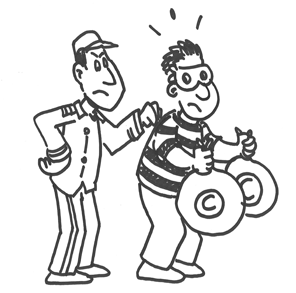Plagiarism
What is plagiarism?
Plagiarism is using someone else’s material while pretending it is your own.
Two examples:
- You submit a report by someone else and pretend you are the author.
- You include someone else’s ideas into your report, while pretending these ideas are your own.
Plagiarism could also occur by accident. For example:
You copied a section of a text from an article or newspaper but forgot to state the source. Although this happened by accident, it is still considered to be plagiarism. You are therefore still responsible for this.
Not everything counts as plagiarism. Some facts are common knowledge and it is not clear (or no longer clear) who thought them up. For example: “The Earth revolves around the sun every 24 hours.”
This knowledge is so common that you do not need to state who once discovered that the Earth revolves around the sun every 24 hours. N.B. If you have any doubts whether a fact is seen to be common knowledge, you should always state the source where you found this information.
Ephorus plagiarism checker
The HvA uses a computer program to check which information was written by you and which information was copied from the internet: the Ephorus plagiarism checker.
When you submit a report through Ephorus, your lecturer will automatically be sent an Ephorus report. This will state exactly which parts of your report are original, and which parts were copied from the internet.
You may, of course, use information from the internet. You must however cite the source! If you fail to cite the source for information copied from the internet, you commit plagiarism.
Many HvA programmes apply rules for the ratio between your own text and texts by others, for example: “A report may not exceed a maximum of 10% quotations.” Take these ratios into account when you are writing. This ratio is shown in the Ephorus report and can thus be checked by a lecturer.
Sanctions
The reports you write for your programme must represent your own ideas and views. Of course, you may use information from others. This is subject to the condition that you clearly cite your sources (see Acknowledgement of sources) and that the vast majority of your report consists of your own text.
If you violate someone else’s copyright, for example by not citing the source, you run the risk of your report being rejected. In serious cases, it may result in expulsion from a programme.
Solutions
It is possible to avoid plagiarism! Always pay close attention! When writing, pay attention to which ideas are your own, which are common knowledge, and which ideas you have copied from someone else. Are you using material from someone else? If so, always cite the source.
See also Acknowledgement of sources..

